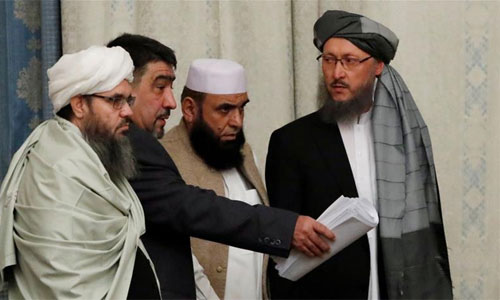Establishing a peace Reconciliation Council, Kabul has announced on Sunday that it will send an official delegation to Qatar peace talks with the Taliban. “For now, an inclusive delegation will go Doha on behalf of the Islamic Republic of Afghanistan and will exchange views with the Taliban,” said Mohammad Omar Daudzai, the Afghan government’s envoy for peace. Daudzai stressed that the delegation will only serve to swap views with the Taliban, and its members would not necessarily be the same as a formal negotiating team. Afghan officials will meet on Wednesday to finalize delegates, and to decide who will comprise that official negotiating team.
Yesterday, President Ashraf Ghani chaired the first meeting of Leadership Council for Reconciliation in the presidential palace. The aim of the meeting was to discuss the formation of a negotiation team who will participate in the Doha conference on 14-15 April. Speaking at the opening ceremony of the Council, President Ghani said the Council has been formed after many consultations. He added that the negotiation team must be formed based on the current realities in Afghanistan and there must be no opportunity for those individuals or groups who have spoken against the system and achievement of the last 18 years.
A copy of proposed list of the council which was reflected in the media shows that 37 individuals from senior government officials, former Jihadi leaders, prominent Afghan politicians, and civil society members are part of the council. Meanwhile, a list of 22 individuals for peace negotiations with the Taliban group was also released, but Ghani’s office said it is not final. As quoted, Daudzai said the number of the council members will be increased in a bid to make it more inclusive. “The reason behind establishing the Reconciliation Leadership Council is to have a common view on peace from the stance of the Islamic Republic of Afghanistan afterward. We will have a unified stance and we expect that we get a clear stance from the Taliban as well,” he said.
He said that they made decisions on six issues in the first meeting of the council and that the next meeting will be held on Wednesday, April 10, where they will approve the final draft of the red lines for the peace process.“The first decision which was made in the council’s meeting was about the red lines. We should have clear red lines when we attend peace and reconciliation negotiations,” he said. He said that former Jihadi leader Abdul Rab Rasul Sayyaf shouldered the responsibility to head a committee and prepare a list of Afghanistan government’s red lines which will be shared with the council on Wednesday. The second decision, he said, was about the list of delegates in Qatar meeting. “It was discussed that the Qatar meeting will not be in the form of negotiations, but it will be a platform to exchange views between different sides in attendance.”
The next decision, he said, was about the formation and structure of the Reconciliation Leadership Council. “It was decided that those who attended the meeting are members of the council, but there is a need for increasing the number of members of the council.” He said that the High Peace Council’s Chairman Mohammad Karim Khalili took the responsibility to chair a committee on the formation of the council. Another decision, Daudzai says, was about determining the authorities of the negotiating team. “It was decided that the procedure and the activities of the negotiating team should be regulated in a way that responsibilities and authorities of the team will be in the light of the Constitution while considering equality between responsibility and authorities,” he said.
In response to the government plan, the Taliban said that the members of delegation can only express their personal views not represent the government. Nevertheless, they have retreated from their previous dogmatic stance; they had repeatedly refused to participate in the peace talks initiated by the Afghan government. This would be the first time that the government officials and Taliban are ready to exchange views about peace process in the country. However, The Taliban officials have held several rounds of talks with US envoy and also with Afghan political groups but did not accept to talk directly to the Afghan government as they consider it a puppet illegitimate regime.
These come short after US envoy Zalmay Khalilzad spent last week in Afghanistan as part of an ongoing push for a peace deal. Khalilzad has repeatedly called on Ghani to form a strong negotiating team to reach a deal before the country´s delayed presidential elections, now slated for September. Last Friday, during a side trip Khalilzad made to Pakistan, Prime Minister Imran Khan said he had some “brotherly advice” for Afghanistan, suggesting an interim government in Kabul to help smooth the talk’s process. Kabul was furious about the comment, and the Ministry of Foreign Affairs summoned a Pakistan diplomat to explain the remarks.
Khalilzad, also met with representatives of the civil society, women, youth as well as tribal elders to discuss the way forward to a peaceful Afghanistan. In his last meeting in Kabul on Sunday, he met with members of the People’s Peace Movement where they emphasized on all-inclusive Afghan talks. Thus, US special envoy held meetings with his counterparts at the European Union in Belgium last week where they discussed their common values. “We talked about our countries’ common values and about the meaningful political and social gains in Afghanistan over the last 18 years, especially for women and children, who must be prioritized in the peace process,” Khalilzad said in a tweet last week. According to the US Department of State, he will also travel to Uzbekistan, Jordan and Qatar until April 10.
Home » Opinion » Kabul to Hold Peace Talks with Taliban in Doha
Kabul to Hold Peace Talks with Taliban in Doha
| Mohammad Zahir Akbari

